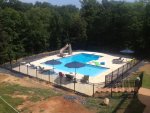Hi, I've been reading the forum for the last week in order to get a handle on pool chemistry since we installed a new SWG. Its been a great resource!
Anyways, a little background we have a 58000 l inground fibre glass pool with sand filter, propane heater and (now) swimpure+ chlorinator. We bought the house at the end of August and had a hard time with the pool for Sept. and Oct. until we closed it for the winter. Hence, upon opening we had a SWG installed to ease our maintenance woes.
My confusion is this, the pool company who put in both the pool and installed the chlorinator AND the local pool store are pretty insistent that we don't need stabilizer. However, the swimpure+ manual AND everything I've read here says to add it.
I had the water tested at the pool store this morning:
Salt: 3000
FC: 2.5
pH: 7.4
TA: 90
CH: 250
CYA: 0
The SWG has been running for 3 days now and the water is clear. (temp 65-69F) We've also been running the pump 24hrs a day.
When I pressed the guy who did the test about why not to add stabilizer this is what he said: "You installed a salt pool so you wouldn't have chemicals in your pool, why add more. Also the stabilizer forms an oily film on the surface of the pool. Your chlorine level will be higher at night and go down in the day but you don't need a constant chlorine level and your water is clear so it's working."
Anyways, I still walked out of the store with 3.8 Kg of the stabilizer and plan to add about 3/4 to the skimmer this afternoon after a backwash on the filter.
Is there anything to what he was saying? I'm guessing they don't really understand how the SWG works and how I'll be seriously shortening the lifetime of my cell if I run w/o stabilizer.
Also how quickly will the pH go down and what should I do to counteract this?
Thanks for all advice!
Alison
Anyways, a little background we have a 58000 l inground fibre glass pool with sand filter, propane heater and (now) swimpure+ chlorinator. We bought the house at the end of August and had a hard time with the pool for Sept. and Oct. until we closed it for the winter. Hence, upon opening we had a SWG installed to ease our maintenance woes.
My confusion is this, the pool company who put in both the pool and installed the chlorinator AND the local pool store are pretty insistent that we don't need stabilizer. However, the swimpure+ manual AND everything I've read here says to add it.
I had the water tested at the pool store this morning:
Salt: 3000
FC: 2.5
pH: 7.4
TA: 90
CH: 250
CYA: 0
The SWG has been running for 3 days now and the water is clear. (temp 65-69F) We've also been running the pump 24hrs a day.
When I pressed the guy who did the test about why not to add stabilizer this is what he said: "You installed a salt pool so you wouldn't have chemicals in your pool, why add more. Also the stabilizer forms an oily film on the surface of the pool. Your chlorine level will be higher at night and go down in the day but you don't need a constant chlorine level and your water is clear so it's working."
Anyways, I still walked out of the store with 3.8 Kg of the stabilizer and plan to add about 3/4 to the skimmer this afternoon after a backwash on the filter.
Is there anything to what he was saying? I'm guessing they don't really understand how the SWG works and how I'll be seriously shortening the lifetime of my cell if I run w/o stabilizer.
Also how quickly will the pH go down and what should I do to counteract this?
Thanks for all advice!
Alison


